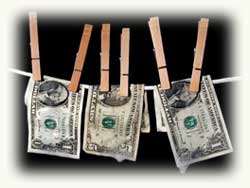 The
actual definition of money laundering is as follows:
The process of creating the appearance that large
amounts of money obtained from serious crimes, such
as drug trafficking or terrorist activity, originated
from a legitimate source. It is very often times,
an accessory crime to others such as drug dealing,
theft, white collar fraud or some other wrongful act.
Transactions that involve “dirty” money
are often associated with some type of legal business.
Structured businesses transactions are conducted in
a manner that provides some percentage of the “dirty”
money to be returned to the criminal. This financial
loophole, becomes a cover up to what appears to be
a legal income for the criminal. Some estimate the
size of the problem is over $500 billion annually.
Often thought of as a victimless crime, money laundering
is a very serious issue. Without it, international
organized crime would not be able to function. The
actual definition of money laundering is as follows:
The process of creating the appearance that large
amounts of money obtained from serious crimes, such
as drug trafficking or terrorist activity, originated
from a legitimate source. It is very often times,
an accessory crime to others such as drug dealing,
theft, white collar fraud or some other wrongful act.
Transactions that involve “dirty” money
are often associated with some type of legal business.
Structured businesses transactions are conducted in
a manner that provides some percentage of the “dirty”
money to be returned to the criminal. This financial
loophole, becomes a cover up to what appears to be
a legal income for the criminal. Some estimate the
size of the problem is over $500 billion annually.
Often thought of as a victimless crime, money laundering
is a very serious issue. Without it, international
organized crime would not be able to function.
The laws
and order of money laundering apply to all individuals
and/or organizations that are looking to launder
money as well as the individual and/or organizations
that are offering a method to convert illegally
made money into the appearance of money that has
been earned legally.
To successfully
prosecute a defendant for this type of crime, an
Assistant United States Attorney (AUSA) must present
efficien evidence that when submitted to a jury
or judge would prove beyond a reasonable doubt:
For violations
of 18 U.S.C. § 1956(a)(1):
1. Such said defendant knowingly conducted or attempted
to conduct a financial transaction;
2. The financial transaction involved proceeds of
a specified unlawful act or activity;
3. Such said defendant knew that the property involved
in the financial transaction represented the proceeds
of some form of unlawful activity; and
4. Such said defendant intended to promote the carrying
on of the specified unlawful act or activity.
For violations
of 18 U.S.C. § 1957:
1. Such said defendant engaged or attempted to engage
in a monetary transaction;
2. Such said defendant knew the transaction involved
criminally derived property;
3. Such said property had a value greater that $10,000;
4. Such said property was derived from some specified
unlawful act or activity; and
5. Such said transaction occurred in the United
States.
How has
the court system defined money laundering violatons?
A. There
was sufficient evidence that the defendants use
of monies wired to him were to pay off his home
or buy a new car and therefore showed even more
of an act to deceive investors to believe he/she
had received such monies from legal activities.
United States v. Johnson, 971 F.2d 562 (10th Cir.
1992).
B. There
was sufficient evidence to prove that defendants
had pre-determined knowledge and the intent to be
found guilty of laundering checks they received
through extortion and mail fraud, where they had
used charities and consulting companies to cloak
their activities with resemblance of legitimacy,
converting charitable donations and lobbying expenses
into personal income. United States v. Hairston,
46 F.3d 361 (4th Cir. 1995).
C. Defendant
laundered money within meaning of 18 U.S.C. §
1957, where he obtaineda loan by falsifying financial
statements, in violation of 18 U.S.C. § 1344,which
is bank fraud, and authorized said bank to act as
his agent in transferring part of loan proceeds
to the balance he owed on another account before
he ever obtained proceeds. United States v. Lee,
232 F.3d 556 (7th Cir. 2000).
Possible
Penalties:
A person may be found guilty of a felony, serve
prison time up to 20 years, and be fined up to $500,000,
or twice what the value of the property involved,
or whichever is greater. (18 U.S.C. § 1956).
A person
may be found guilty of a felony, serve prison time
up to 10 years, and be fined up to $250,000, or
twice the amount of the property involved, or whichever
is greater. (18 U.S.C. § 1957).
Frequently,
the State’s Assistant U.S. Attorney (AUSA)
will secure a Federal Indictment from a Federal
Grand Jury and charge a defendant not only with
money laundering, but also with mail, fraud, securities,
wire and bank fraud, public corruption, or RICO
crimes, and conspiracy to commit the crimes mentioned
above. One should be aware that since 1987 parole
has been abolished in the Federal System. Expungement,
which is the removal of a conviction from public
records is also not available.
|

